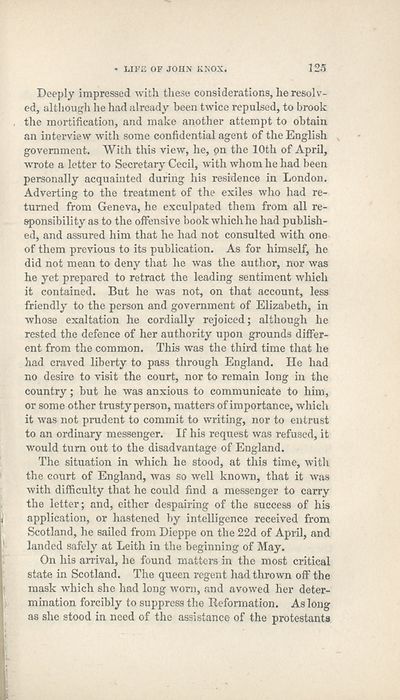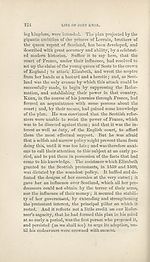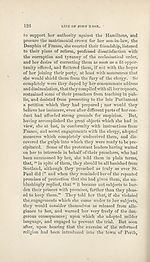Download files
Complete book:
Individual page:
Thumbnail gallery: Grid view | List view

* LIFE OF JOHN KNOX.
125
Deeply impressed with these considerations, he resolv¬
ed, although he had already been twice repulsed, to brook
the mortification, and make another attempt to obtain
an interview with some confidential agent of the English
government. With this view, he, pn the 10th of April,
wrote a letter to Secretary Cecil, with whom he had been
personally acquainted during his residence in London.
Adverting to the treatment of the exiles who had re¬
turned from Geneva, he exculpated them from all re¬
sponsibility as to the offensive book which he had publish¬
ed, and assured him that he had not consulted with one
of them previous to its publication. As for himself, he
did not mean to deny that he was the author, nor was
he yet prepared to retract the leading sentiment which
it contained. But he was not, on that account, less
friendly to the person and government of Elizabeth, in
whose exaltation he cordially rejoiced; although he
rested the defence of her authority upon grounds differ¬
ent from the common. This was the third time that he
had craved liberty to pass through England. He had
no desire to visit the court, nor to remain long in the
country; but he was anxious to communicate to him,
or some other trusty person, matters of importance, which
it was not prudent to commit to writing, nor to entrust
to an ordinary messenger. If his request was refused, it
would turn out to the disadvantage of England.
The situation in which he stood, at this time, with
the court of England, was so well known, that it was
with difficulty that he could find a messenger to carry
the letter; and, either despairing of the success of his
application, or hastened by intelligence received from
Scotland, he sailed from Dieppe on the 22d of April, and
landed safely at Leith in the beginning of May.
On his an-ival, he found matters in the most critical
state in Scotland. The queen regent had thrown off the
mask which she had long worn, and avowed her deter¬
mination forcibly to suppress the Reformation. As long
as she stood in need of the assistance of the protestants
125
Deeply impressed with these considerations, he resolv¬
ed, although he had already been twice repulsed, to brook
the mortification, and make another attempt to obtain
an interview with some confidential agent of the English
government. With this view, he, pn the 10th of April,
wrote a letter to Secretary Cecil, with whom he had been
personally acquainted during his residence in London.
Adverting to the treatment of the exiles who had re¬
turned from Geneva, he exculpated them from all re¬
sponsibility as to the offensive book which he had publish¬
ed, and assured him that he had not consulted with one
of them previous to its publication. As for himself, he
did not mean to deny that he was the author, nor was
he yet prepared to retract the leading sentiment which
it contained. But he was not, on that account, less
friendly to the person and government of Elizabeth, in
whose exaltation he cordially rejoiced; although he
rested the defence of her authority upon grounds differ¬
ent from the common. This was the third time that he
had craved liberty to pass through England. He had
no desire to visit the court, nor to remain long in the
country; but he was anxious to communicate to him,
or some other trusty person, matters of importance, which
it was not prudent to commit to writing, nor to entrust
to an ordinary messenger. If his request was refused, it
would turn out to the disadvantage of England.
The situation in which he stood, at this time, with
the court of England, was so well known, that it was
with difficulty that he could find a messenger to carry
the letter; and, either despairing of the success of his
application, or hastened by intelligence received from
Scotland, he sailed from Dieppe on the 22d of April, and
landed safely at Leith in the beginning of May.
On his an-ival, he found matters in the most critical
state in Scotland. The queen regent had thrown off the
mask which she had long worn, and avowed her deter¬
mination forcibly to suppress the Reformation. As long
as she stood in need of the assistance of the protestants
Set display mode to:
![]() Universal Viewer |
Universal Viewer | ![]() Mirador |
Large image | Transcription
Mirador |
Large image | Transcription
| Antiquarian books of Scotland > Scotland/Scots > Life of John Knox ; and, The life of Alexander Henderson > (143) |
|---|
| Permanent URL | https://digital.nls.uk/131834020 |
|---|
| Description | Thousands of printed books from the Antiquarian Books of Scotland collection which dates from 1641 to the 1980s. The collection consists of 14,800 books which were published in Scotland or have a Scottish connection, e.g. through the author, printer or owner. Subjects covered include sport, education, diseases, adventure, occupations, Jacobites, politics and religion. Among the 29 languages represented are English, Gaelic, Italian, French, Russian and Swedish. |
|---|

